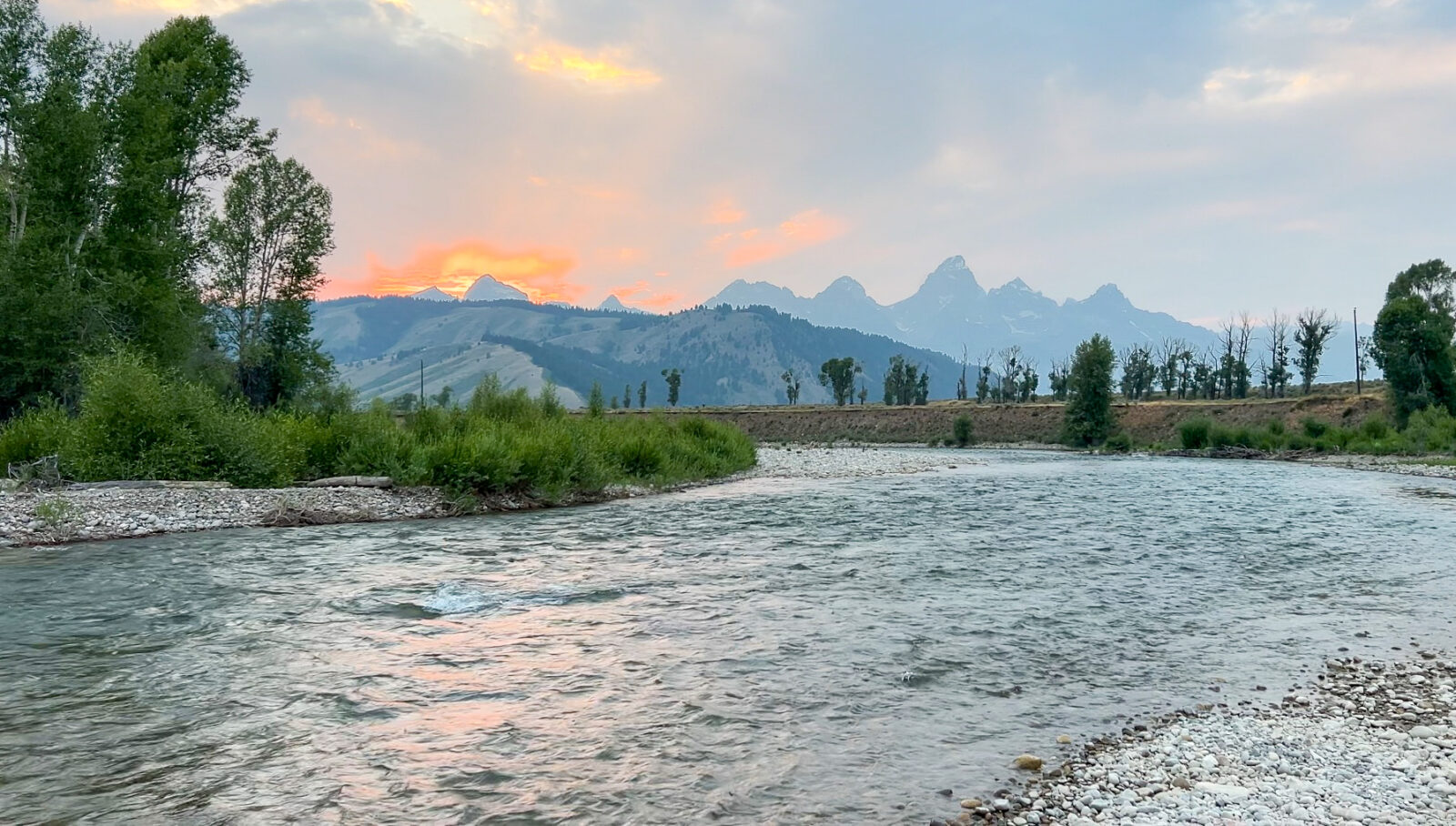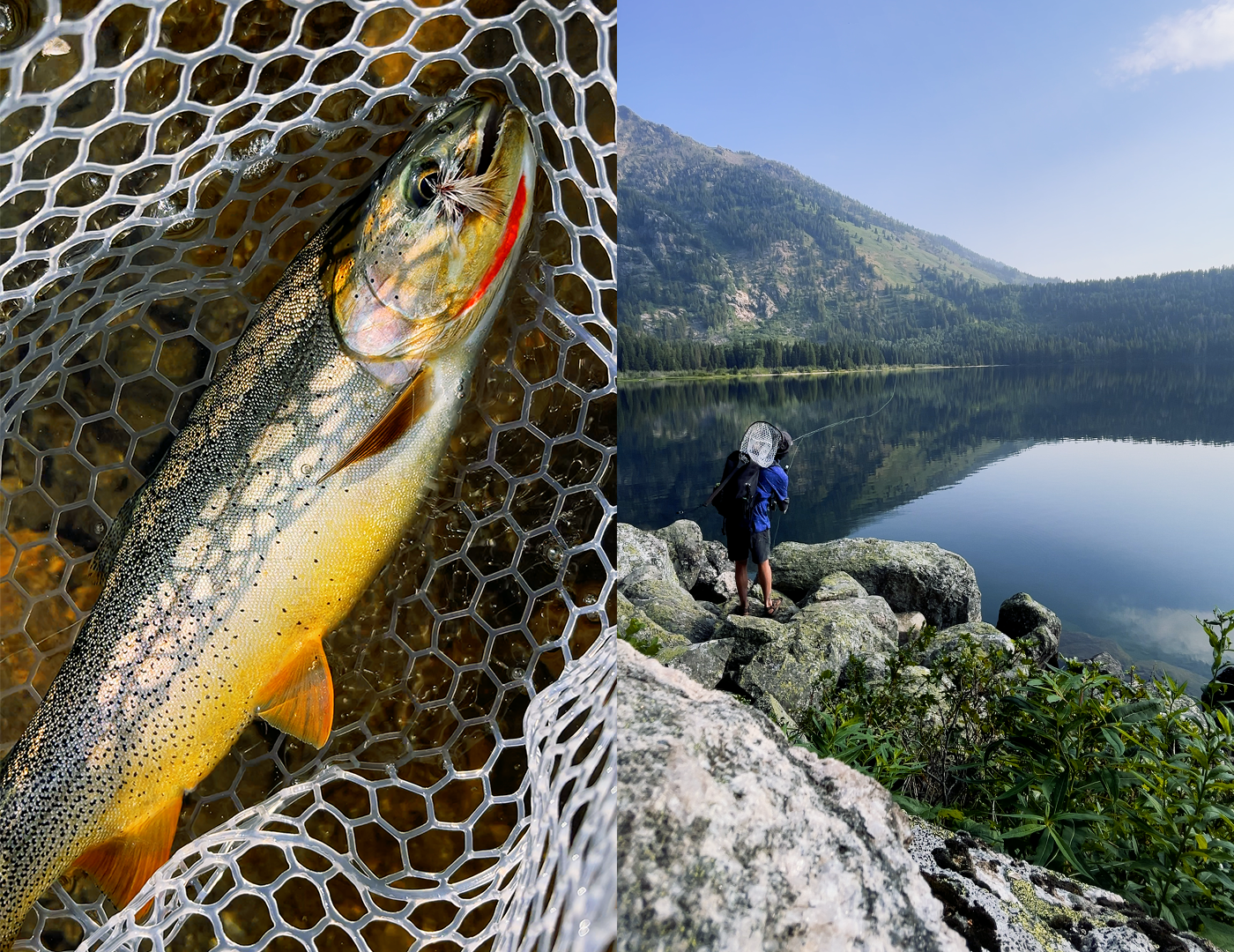As you may know, CJP has been supporting many important emergency endeavors in Israel since the Oct 7th, 2023 attack as part of Phase I and Phase II of the CJP Israel Emergency Response. Here is the link for background: https://ma.cjp.org/israel-emergency-fund-where-your-support-goes. I recently had the honor of being part of a very important and impactful CJP Innovation mission to Israel as a follow up to all the emergency aid so far. This particular mission was to look at support requesting organizations that had impact of outlying significance as well as emerging organizations started by business people turned social entrepreneurs, many from Israel’s high-tech “Start-up Nation” cohort. I traveled with a group of 25 amazing people, representing CJP professionals and community members from a wide range of experiences (entrepreneurs, innovators, community leaders, business owners, family foundation leaders and clergy), wonderfully lead by our Co-chairs Michael Bohnen and Rebecca Leventhal. We were to utilize a holistic approach using head, heart, and hands to guide our recommendations to CJP’s Israel Emergency Fund (“IEF”) Committee informing the distribution of some $25 Million to help Israel Build Back Better. The mission seemed very simple when we were first briefed. We were to meet with 12 organizations that would present their pitches and we were to listen, ask questions, and make notes/grade each organization on a very well-articulated rubric (Ability to Meet Need, Opportunity to be Transformational, Demonstrates Innovation, Strong Leadership, Path to Sustainability, and Manageable/Worthy Risks). In fact, it turned out not to have been so simple. No worthy mission ever is.
I was in Israel just a little over a year ago, on CJP’s Spark trip to celebrate Israel’s 75th anniversary of becoming a State. Then, as on prior visits, I experienced Israelis (in general) as tough and undeterred. I found my recent visit very different. They seemed more open and vulnerable. In the many times I have been to Israel, I do not think anyone ever said thank you for coming to Israel from America. This time Israelis (even those unaware that I was on a funding-tied mission) were very appreciative of our being there.
Of course, people in Israel spoke of continued concern about the future security of the country and their desperation for the hostages to be released. They were also very open to communicating how Oct 7th had affected them and their families, personally. Trauma and mental health were prevalent concerns.
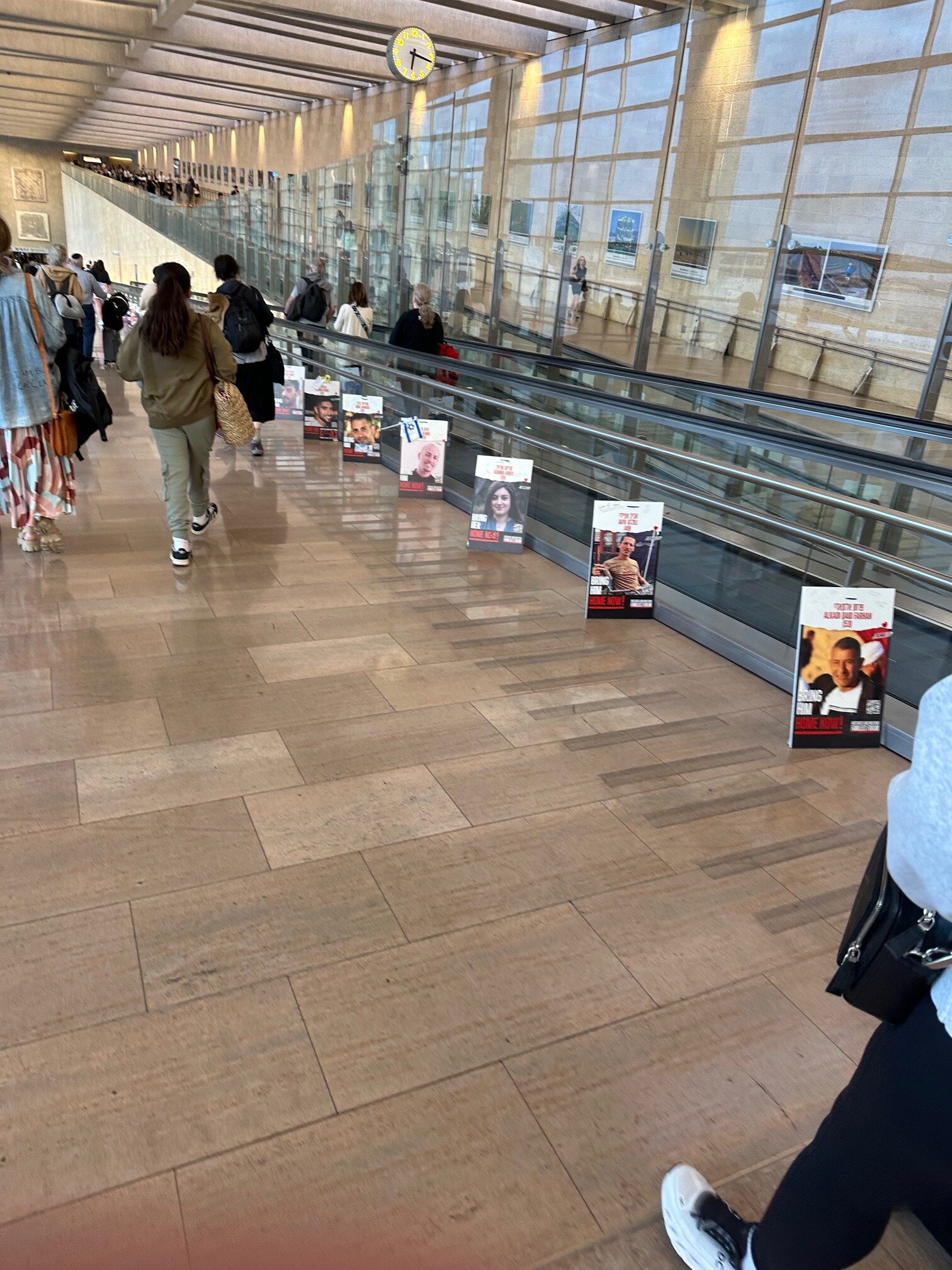 Even upon arrival, Israel’s national priority, getting all the hostages back to their families – was front and center. Every hostage’s picture and short bio was listed along the walkway to customs. There is now a center in Tel Aviv entirely dedicated to supporting the families of hostages, through advocacy, marketing/communications, financial assistance, etc. It is called The Hostages and Missing Families Forum and receives funding from CJP https://stories.bringthemhomenow.net/
Even upon arrival, Israel’s national priority, getting all the hostages back to their families – was front and center. Every hostage’s picture and short bio was listed along the walkway to customs. There is now a center in Tel Aviv entirely dedicated to supporting the families of hostages, through advocacy, marketing/communications, financial assistance, etc. It is called The Hostages and Missing Families Forum and receives funding from CJP https://stories.bringthemhomenow.net/
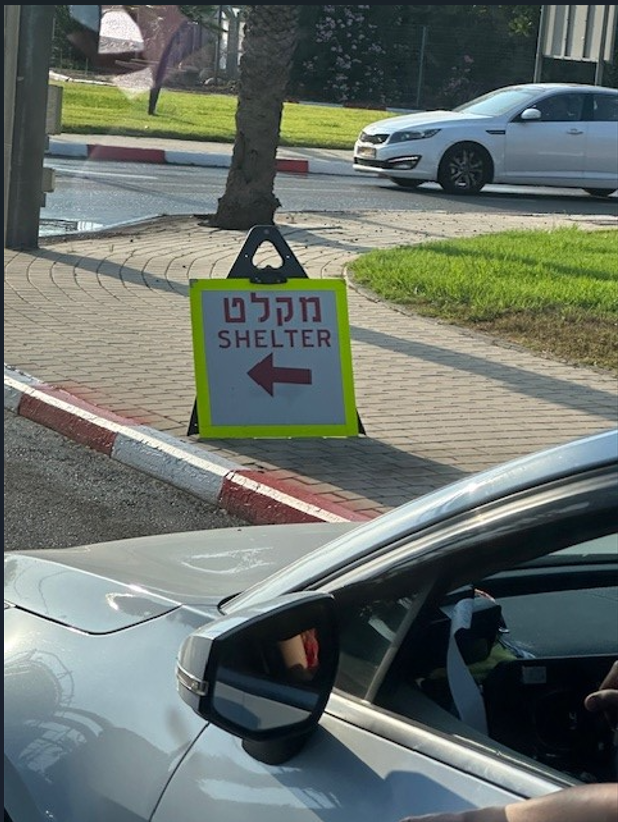 And let there be no doubt that Israel’s citizens are always on the alert for any possible attack. It is a way of life. Some areas in Israel have more time to respond than others, based on their proximity to hostile areas. From the time a siren sounds, citizens may have only twenty-five seconds to two minutes to get to a shelter.
And let there be no doubt that Israel’s citizens are always on the alert for any possible attack. It is a way of life. Some areas in Israel have more time to respond than others, based on their proximity to hostile areas. From the time a siren sounds, citizens may have only twenty-five seconds to two minutes to get to a shelter.
The mission started fast and furiously, so there was no time to contemplate the lack of sleep on the EL AL flight from Boston to Tel Aviv. We were met by local leaders who gave us a briefing on the status of the populace, the significant trauma that was shared throughout the country, and the distrust in the Government’s ability to provide security. It reminded me of how we all felt in the U.S. after the 9/11 attacks. We could not believe that there had been such an intelligence failure, nor that the government had failed to protect us. Could/would they protect us in the future?
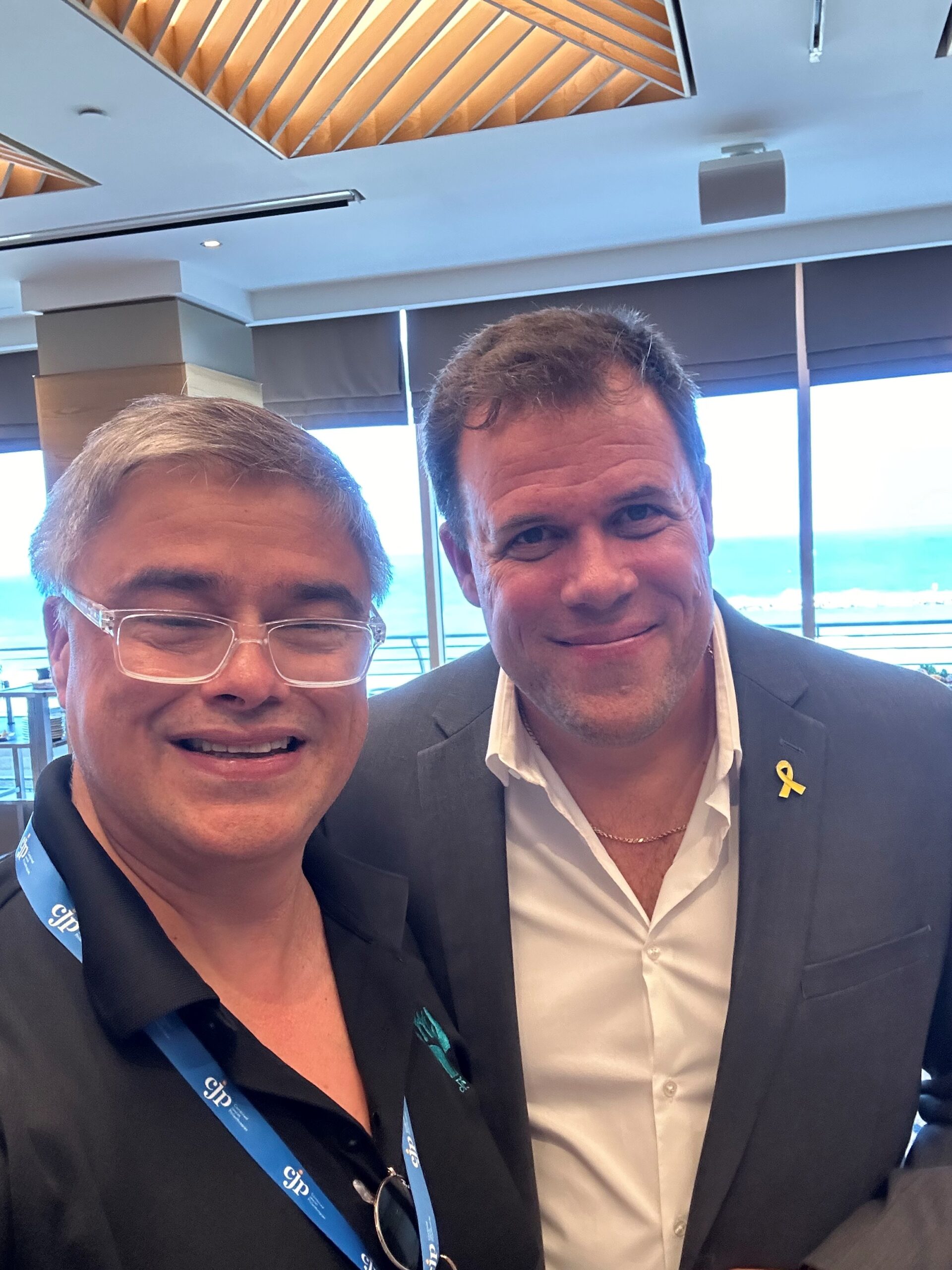 An especially poignant brief was from Retired LT Colonel Jonathan Conricus (IDF RET) https://www.fdd.org/team/lt-col-ret-jonathan-conricus/. You may have seen him on CNN when he was on active duty as a communication correspondent for the Israeli Defense Force (IDF). Based on his many years of extraordinary service, he is very clear that stability in Israel cannot be achieved until Iran is held accountable by the international community for their many acts of terrorism and for those of their proxies in the region. It was great to meet him.
An especially poignant brief was from Retired LT Colonel Jonathan Conricus (IDF RET) https://www.fdd.org/team/lt-col-ret-jonathan-conricus/. You may have seen him on CNN when he was on active duty as a communication correspondent for the Israeli Defense Force (IDF). Based on his many years of extraordinary service, he is very clear that stability in Israel cannot be achieved until Iran is held accountable by the international community for their many acts of terrorism and for those of their proxies in the region. It was great to meet him.
Over the next 3 days, our group set out to listen, question and experience what 12 NGOs (Non-government Organizations /Non-profits) proposed as essential next steps to Build Back Better. The causes/organizations were divided in the following 4 categories: Mental Health (2), Community-Specific Rehabilitation (3), Economic Relief (3), and Supporting the Most Vulnerable Populations (4). All had strong leadership track-records, offered innovative intervention models, and proposed ecosystem transformation in keeping with the Build Back Better concept. All the presentations were heart-wrenching as each organization had lives at stake – some immediate, some intermediate, and some longer term. We found all worthy and wanted to say yes to all (The Heart), but we needed to be mindful of supporting the most impactful (The Mind) and the proposals had to be actionable (The Hand). I could write volumes about all 12 of them but instead will focus on those that resonated most with me.
From my 22 years in the U.S. Navy, I know one thing to be certain – war is hell for all involved. Those on the frontline, their families, and innocent civilians in the path of war suffer the most. In Israel there is not the same level of support for physically or emotionally injured soldiers as we have in the U.S. Despite the shortcomings of our VA system, it does have programs to treat the injured and assist their families with much needed support. There exists great need for support for the large number of injured Israeli soldiers and their families. Within the category of “Supporting the Most Vulnerable Populations” the first two organizations brought it home for me:
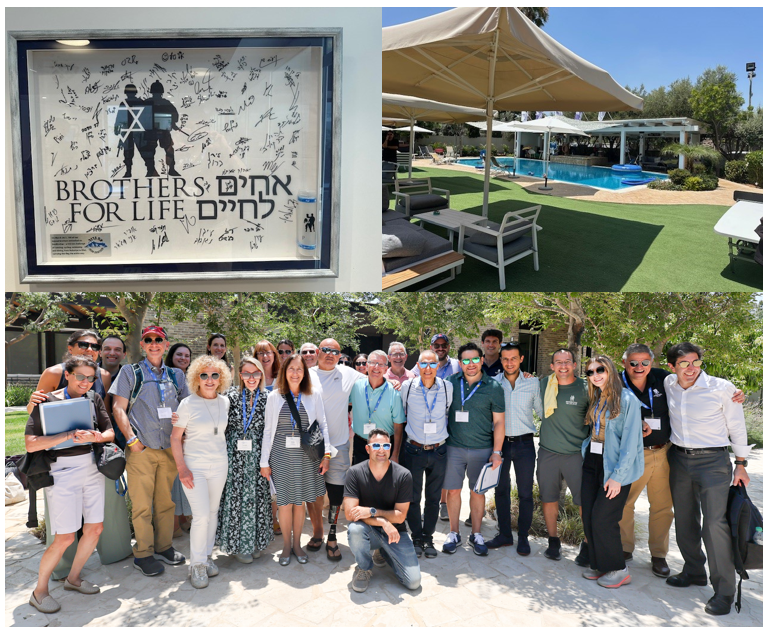
Brothers for Life: https://www.brothersforlife.com/– Israel’s Wounded Warrior Program- offers comprehensive support including financial, social, employment, medical, etc. services. I have been involved personally with Brothers for Life and Local US Wounded Warriors and sit on the board of the Greater Boston Veterans Collaborative https://www.collaborate.vet/. Every year 10 Israeli wounded soldiers come to Massachusetts and they get to meet 10 other U.S. wounded warriors at Gillette Stadium, thanks to the generosity of the Kraft family. It is a powerful event that permits them to talk about their injuries with fellow injured soldiers and to form healing bonds. I was afforded the opportunity of visiting, for the first time, their complex near Ben Gurion Airport where I met with recovering soldiers/families as well as with several of the leaders I have befriended over the years.
Israeli Children’s Fund (ICF): https://www.israelichildrensfund.org/ – The brief by their CEO, Lior Krengel, was immensely moving, as just that morning, two parents had been fatally wounded by Hezbollah rockets in the north of Israel, leaving more children orphaned. There are currently over 400 Israeli children from 199 families who have lost at least one parent as a result of this war – and the number is anticipated to grow. Of these victims, 82% lost their fathers, typically the families’ primary “breadwinners.” Many witnessed brutal killings; endured hiding, fear and isolation; lost other relatives and friends. Unconscionably, some even were taken hostage by Hamas.
Israeli Children’s Fund is a new entity founded by Lior Krengel, who, prior to turning her attention to war response, was active in the Israeli innovation and tech industry. The goal of ICF will be to provide $200,000 per child in this vulnerable population to support their resiliency through adulthood.
Other great organizations included:
Tribe of Nova Foundation: https://www.tribeofnova.com/ – Within 24 hours of the attack on 3,800+ Nova Festival attendees, the community’s founders established an emergency emotional support facility to help members deal with their unimaginable trauma. The organization has not stopped convening survivors and their families, and families of murdered victims, as well, for the Tribe of Nova’s non-clinical healing program and services. Tribe of Nova leaders are requesting funding for the establishment of “Beit Nova,” a permanent center for service programs for this community of survivors. In my experience, very specific tragedy support groups work through a shared bond in loss. I have seen it for survivors of 9-11, the Marine families of those lost in the US Marine Barracks in Lebanon 1983, and the USS Cole attack in Yemen in 2000.
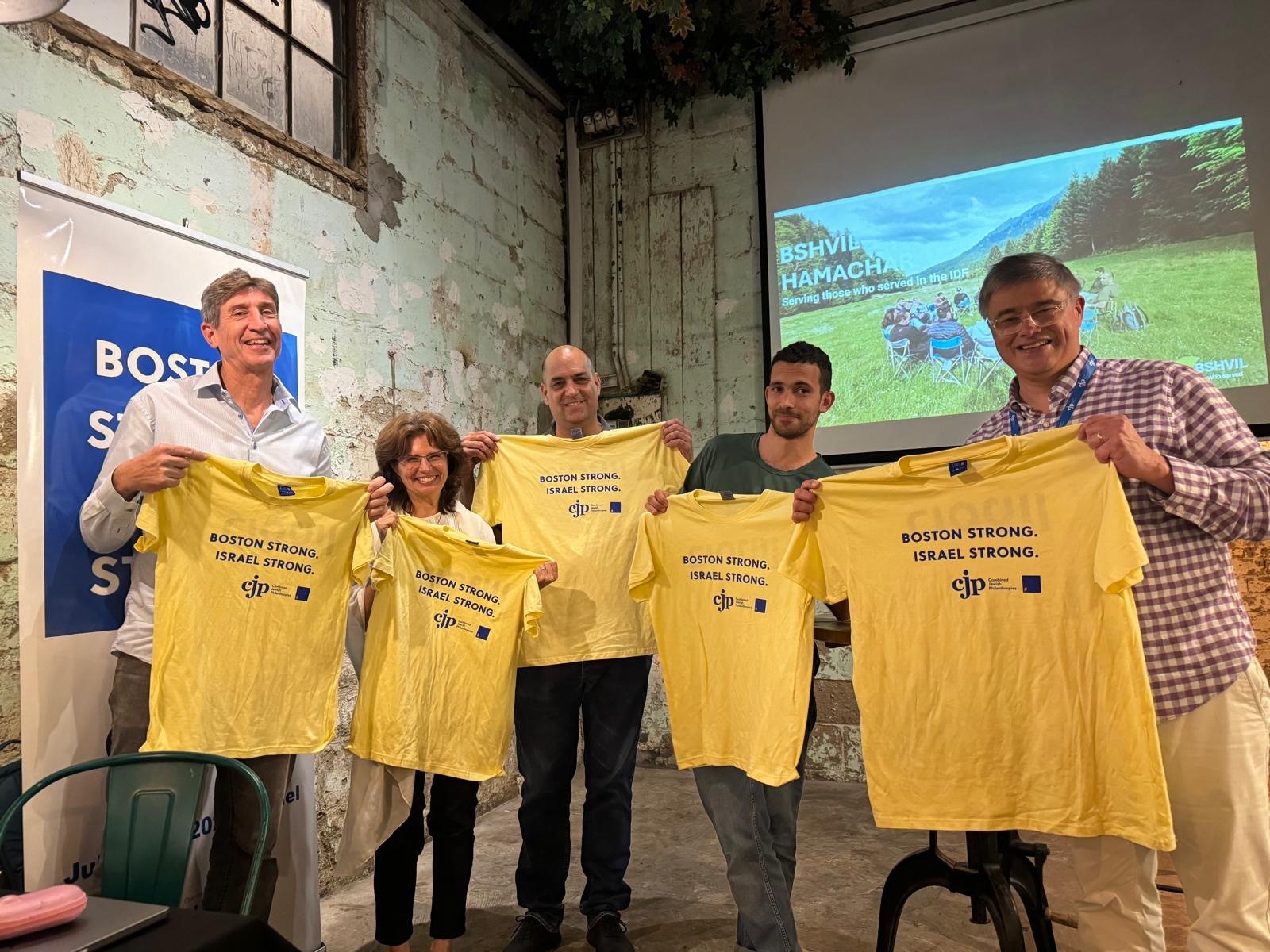 Within the Mental Health category of need I was very much moved by the work of Bshvil Hamachar (On the Path to Tomorrow): https://friendsofbshvil.org/. Bshvil Hamachar mitigates the onset of PTSD in Israeli combat reservists returning from war. The IDF estimates that 95,000 active-duty soldiers and reservists will require mental health treatment and support to process their traumatic experiences of war in Gaza and the Northern Front. Bsvhil runs early intervention therapy programs in a peer-to-peer setting that helps combat units recover from their time of duty.
Within the Mental Health category of need I was very much moved by the work of Bshvil Hamachar (On the Path to Tomorrow): https://friendsofbshvil.org/. Bshvil Hamachar mitigates the onset of PTSD in Israeli combat reservists returning from war. The IDF estimates that 95,000 active-duty soldiers and reservists will require mental health treatment and support to process their traumatic experiences of war in Gaza and the Northern Front. Bsvhil runs early intervention therapy programs in a peer-to-peer setting that helps combat units recover from their time of duty.
A participant on the mission was asked to introduce each organization before its pitch. I am grateful for having the honor of introducing Bshvil Hamachar, for I know what untreated PTSD can do to our war fighters. We owe them proper care for their sacrifice.
I’m pictured here with their brave leadership team holding Boston/Israel Strong t-shirts.
Last but certainly not least, within the category of Economic Relief I found the following organization’s plan extremely impactful: PLACE-IL https://place-il.org/ was established by Israeli high-tech executives (entrepreneurs, CEOs, development and technology leaders, multinational companies, investors, and venture capital funds). The program is designed to solve three major barriers that prevent high-tech companies from recruiting candidates from underrepresented populations on a significant scale: (1) a scattered and unsystematic supply of candidates (coming from academia, training organizations, and non-profit organizations), (2) the screening and recruitment methods of companies that miss the potential interest in candidates from underrepresented populations (most are recruiting only Israelis that were in Intelligence units), (3) a minority of junior positions – intended for candidates without any work experience in high-tech.
Place-IL launched an effort to create local employment opportunities for the residents of the Western Negev, including both Jewish and Arabs, in high-tech companies without requiring them to make a daily trip to the center of the country (Tel Aviv). They have secured funds from the government, tech partners and foundations. I find this amazing. Imagine that the attack on Oct 7th can actually serve to bring more inclusion as companies strive to Build Back Better. Their CEO, Idan Tendler, is quite impressive and knows how to start up new ventures https://place-il.org/about/. This initiative will also shift tech work that is exclusively centered in Tel Aviv to the south where there will be more cost-effective housing.
In between all the pitches we did get to experience and learn from some of the work CJP has already been funding. One of the more impressive projects is Kibbutz Re’im Towers in Tel Aviv. Kibbutz Re’im in Southern Israel was the site of the music festival (Nova) that was one of the primary targets of the Hamas attack on October 7th. The residents of Kibbutz Re’im displayed immense courage, resisting Hamas militants for more than seven hours until reinforcements arrived. The 430 surviving kibbutz members temporarily relocated to a hotel in Eilat (southernmost part of Israel), with nothing but the clothes they were wearing. Money from CJP’s Israel Emergency Fund provides temporary housing in Tel Aviv for all 430 kibbutz members, along with essential items (such as clothing and furniture), and a communal space in Tel Aviv for Re’im residents to gather for activities. The CJP grant provides much-needed psychological support for survivors of the attack, support for Re’im children as they integrate into Tel Aviv schools, and resources to help create a kibbutz business recovery plan. CJP was the first federation to pilot offering kibbutz-specific aid. The towers are beautiful and we witnessed first-hand happy residents and playful kids all over the grounds. What a great accomplishment!
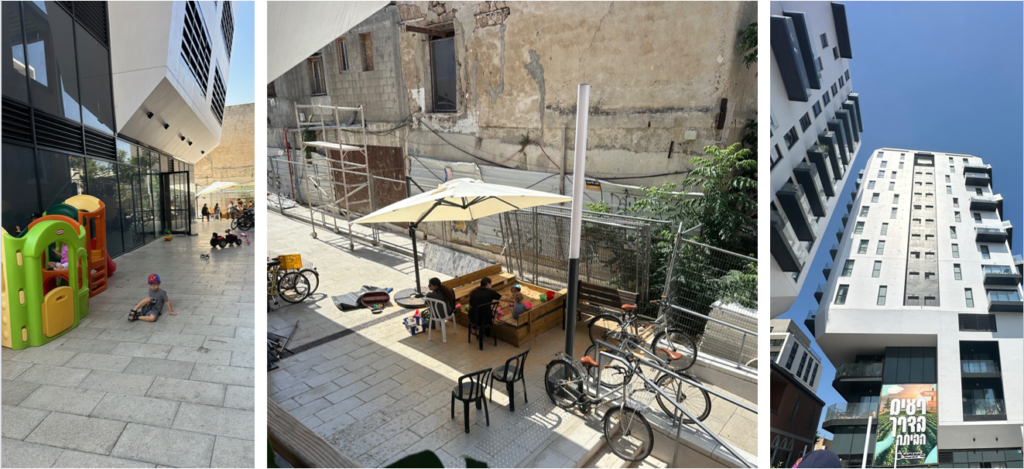
Another great organization we got to meet is Hagal Sheli (My Wave) https://hagalsheli.co.il/en/ourstory/, an organization that helps individuals, especially youth, deal with trauma through the discipline of learning how to surf. The organization has great leadership and uses what has proven to be a very effective intervention model. It was a pleasure to get a two-hour “taste” of their program. I’m told that it normally takes a few days to get folks up on the board; so I think having accomplished the knee surf (after an exhausting two hours) was just fine. We all had great fun and could see how this can help with the long journey of working through trauma.
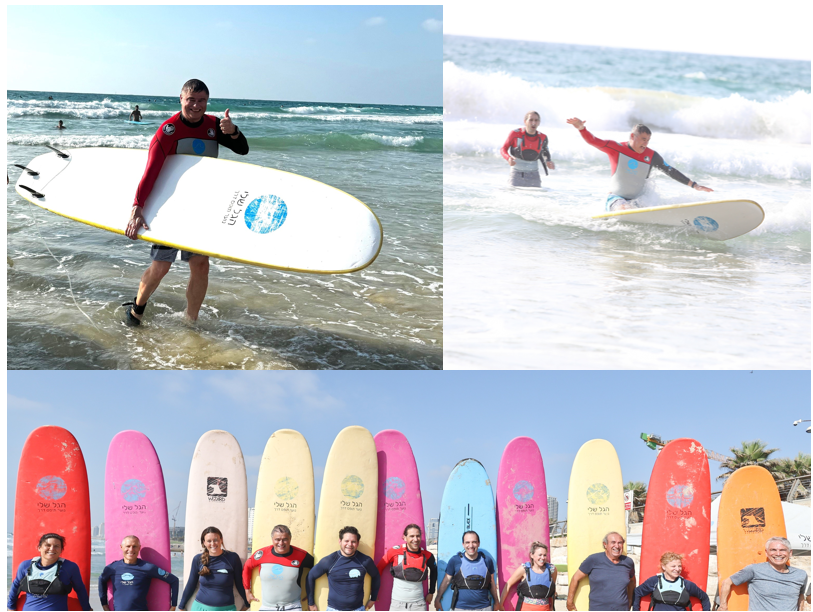
After the first 3 days of the mission, a few of us ventured to the Gaza Envelope on a tour to witness first-hand what happened on Oct 7th. Pain, anger, hope and a desire for long lasting peace all swirled at the same time. We were absolutely honored and lucky to have met Rafael (white shirt below) the father of Ben Shemoni who was a hero on Oct 7th. https://www.timesofisrael.com/ben-shimoni-31-music-loving-angel-who-saved-9-from-supernova/.

He just happened to be there. He goes to the Nova Concert site twice a week to talk about his son to anyone who will listen. His description of his son and the communications he had with him that morning where gut-wrenching. He said not to worry. He is proud of what his son did and is kept strong by a promise to continue to live the best life possible. He said that this is the best legacy he can give his son. Wow!
Then we went to Kibbutz Kfar Aza, one of the Kibbutz heavily destroyed by the attack on Oct 7th. There are no adequate words; the pictures say it all. The members who remain on the Kibbutz are ready to rebuild and welcome the rest back. ‘Amazing resiliency!
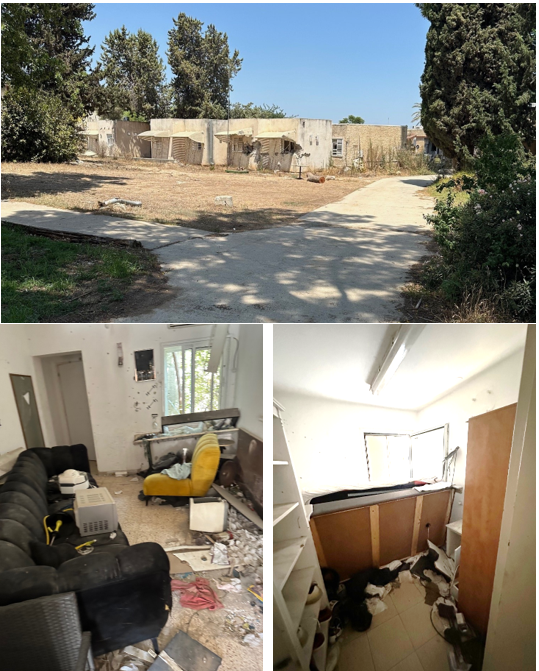
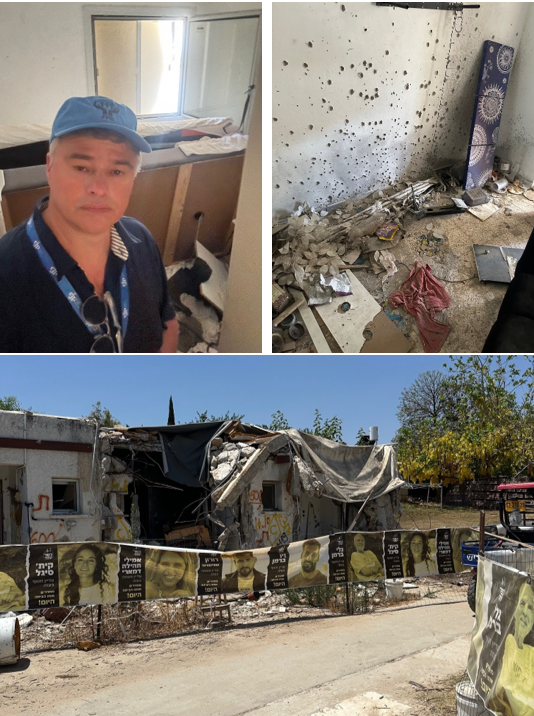
Our mission concluded in Jerusalem. It was a pleasure to meet and hear from U.S. Ambassador to Israel Jacob Lew.
https://il.usembassy.gov/our-relationship/our-ambassador/. He was very open and as you can imagine has to currently work in a very complicated arena. Our group is pictured with him.
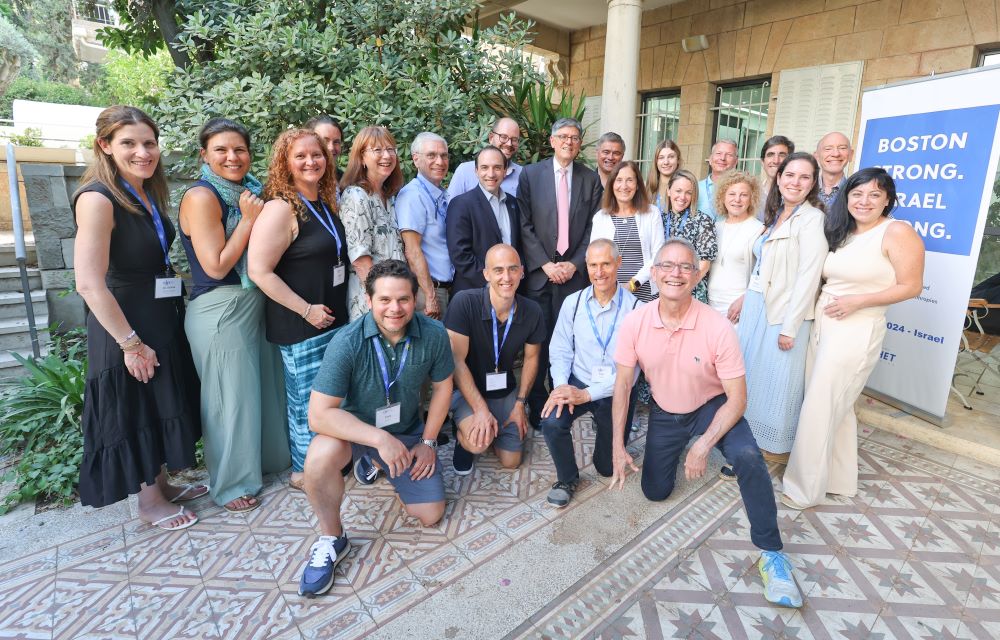
And no visit is complete without a visit to the Western Wall in Jerusalem.
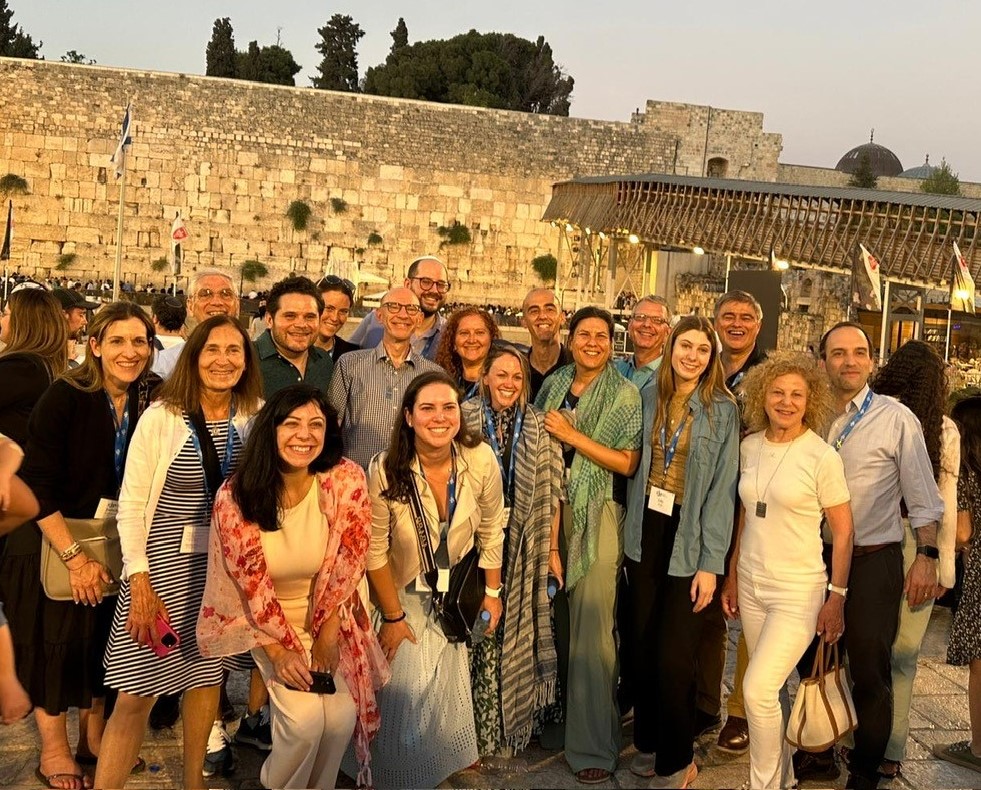
Our mission group recently met to reflect on the mission and next steps for our recommendations to the Israel Emergency Fund Committee. We all talked about what the mission meant to us. As I have experienced personally on other missions, the bonds that developed among us on this mission will allow us to continue the work needed to mend our broken world. The overarching mission continues and may we have peace soon.
